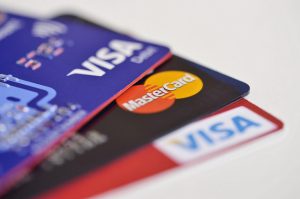With thousands of holders nationwide it’s probably fair to describe credit card consumers here as credit card enthusiasts. And it’s easy to understand why – credit cards are an incredibly convenient payment method, allowing you to make small or large purchases without the need to carry cash.

But credit cards can also lead you down the path to costly debt by allowing you to buy goods you can’t afford to repay.
On average, credit card consumers here owe thousands of dollars on their credit card and are paying approximately several hundreds in interest a year.
Being a responsible credit card holder requires you to read the fine print and familiarise yourself with common credit card traps to avoid a cycle of debt. Here are five of the most common mistakes credit card consumers make which is costing them money:
Paying the bare minimum
Minimum repayments can be as low as 1.5 percent of the outstanding amount. But by paying the minimum, you don’t cover your interest payments and end up paying more interest overall as it takes you longer to pay off your debt. Ideally, you should pay the balance in full each month. If that’s not possible, pay as much as you can to reduce the amount of debt left sitting on your card.
Cash advances
It is important to note that interest-free periods do not apply to cash advances. In fact, credit card providers charge exorbitant interest on cash advances – approximately as high as 29 percent. But that’s not the only trap associated with cash advances. In many cases, you will be hit with interest as soon as you withdraw the cash as well as having to pay a withdrawal fee. This fee may be a percentage of the amount you withdraw (the bigger the amount, the bigger the fee) or a flat amount. With cashless payments becoming increasingly available everywhere from cafes to clothes shops there’s really no need to be falling into such a costly trap.
Introductory rates
Most credit cards offer low interest rates for a short period of time to entice you to sign up. Such introductory rates last for up to 12 months before they rise to the standard rate – on some cards, this can be twice or triple the introductory rate. If you pay your monthly balance in full, this won’t affect you; if you don’t, this is a common and painful trap. Before you sign up to any credit card, ensure the “revert rate” is competitive.
Rising interest rates
Credit card issuers can increase the interest rate they charge you with little or no warning, so you may suddenly find yourself racking up debt at a faster rate. In some cases, the minimum repayment stays the same, which means you end up paying less of the principal amount while the interest grows. If this happens, it may be worth considering switching to a credit card with a better rate.
Multiple fees
In addition to the annual fee and interest charges, your card provider can slap you with fees depending on how you use your card. These can include fees for exceeding your credit limit, late payment of your monthly statement, replacing a lost card and making overseas ATM withdrawals. Use your card sensibly to avoid extra fees.
These traps shouldn’t put off credit card consumers from getting a card but they should make them think about how to use one responsibly. Before committing to a card compare what’s on the market to ensure you’re receiving the a competitive card that will suit your lifestyle and spending habits.
Credit cards have become an integral part of everyday modern life. Especially in this digital age where contactless and mobile transactions are the way to go, it is uncommon to find a peer without a credit card in his or her wallet.
However, the growing trend of credit cards usage also means that more and more people are susceptible to credit activity. Want to buy a $15,000 watch but barely have enough sitting in the bank account? No problem, just sign up for the 0% interest 12 months instalment plan on the card and one could easily own the watch.
Eyeing on the dream Europe vacation? Just swipe your card, and you can jet off to your dream holiday.
Before long, you would find your total outstanding balance and interest accumulated on the credit cards snowballing, and you would have a hard time repaying the debt.
The way that one can easily slip into massive amounts of credit card debt is similar to falling into a trap. It is important to manage and prevent accumulation of credit card debt.
Because having a bad mark regarding poor payment or default would significantly impact your credit score. Also, it affects your bigger financial goals such as owning your dream house. For example, a default record stays on your credit report for three years even after a full repayment!
You should spend less than you earn. Yes, the credit limit of that newly approved credit card may look tempting, especially for a fresh graduate who just stepped out into the workforce. For those who are already holding several credit cards from different issuers, the total credit limit added up from all your cards may well exceed four to eight times of your monthly income.
However, your credit limit does not equate to your spending capacity. More often than not, it can be way above your ability of repayment. Reassess your current finances before you use up your credit limits to swipe for that dream watch or vacation.






